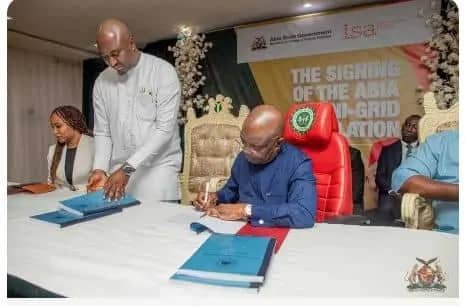The Dawn of Light: How a Single Signature is Illuminating the Future of Abia
In a move being hailed as a monumental breath of fresh air, the landscape of power and potential in Abia State is undergoing a radical transformation. Under the leadership of Governor Alex Otti, a new chapter is being written, one where the hum of electricity is becoming the soundtrack to progress for communities too long left in the dark.
A New Framework for Power and Prosperity
The catalyst for this change is the recent formalization of the Abia State Mini-Grid Regulation. This is far more than bureaucratic paperwork; it is a visionary framework that does far more than just keep the lights on. Governor Otti himself articulated the profound implications of this decision, declaring it a key that unlocks new frontiers in the state’s electricity market. This is not merely a policy; it is an open invitation. An invitation to competent investors and development partners to bring their expertise and resources to the table and participate in building a brighter, more empowered Abia.
The National Policy Unleashing Local Potential
This groundbreaking initiative is made possible by the progressive amended Electricity Act of 2023, a federal legislation championed by President Bola Tinubu. This act represents a historic shift in national policy, moving power from the exclusive list to the concurrent legislative list. This critical change effectively empowers states to take control of their energy destiny, moving away from a one-size-fits-all approach. Governor Otti’s administration has seized this opportunity with both hands, refusing to wait for a centralized solution and instead choosing to build one from the ground up, tailored to the unique needs of Abia’s people.
Empowering Communities, One Mini-Grid at a Time
The true genius of the mini-grid system lies in its decentralized nature. It empowers local communities with tailored energy solutions, ensuring that power generation is as close to the people who use it as possible. This means that remote and underserved communities, once considered unprofitable and forgotten by major grid extensions, can now experience the transformative power of electricity. This energy will pump water for farms, preserve goods for market women, power tools for artisans, and illuminate classrooms for children, fundamentally altering the economic and social fabric of the state for generations to come.
Igniting an Economic Revolution
Beyond the obvious benefit of light, this regulation is a powerful economic engine. It creates a transparent and secure environment for private investment, assuring partners of a fair and structured market. It fosters the adoption of alternative energy, promoting sustainability and innovation while reducing reliance on unstable national infrastructure. Critically, it establishes clear mechanisms to resolve disputes, protecting both the investor and the common man, ensuring that progress is built on a foundation of fairness and trust. This holistic approach unlocks opportunities for small businesses, improves public services like healthcare and education, and lays the groundwork for inclusive growth.
A Collective Effort for a Brighter Tomorrow
The collective effort behind this achievement has not gone unnoticed. Governor Otti extended commendations to the dedicated teams at the Abia State Electricity Regulatory Agency (ASERA) and the State’s Ministry of Power and go Public Utilities for their meticulous work in bringing this vision to life. Their expertise has ensured the regulation is both robust and practical.

The message from Abia State is now clear and luminous. This is about more than just megawatts; it is about human potential. It is a testament to the power of visionary leadership to ignite hope and deliver tangible progress, one community, one light, and one opportunity at a time.
AProf Chukwuemeka Ifegwu Eke







